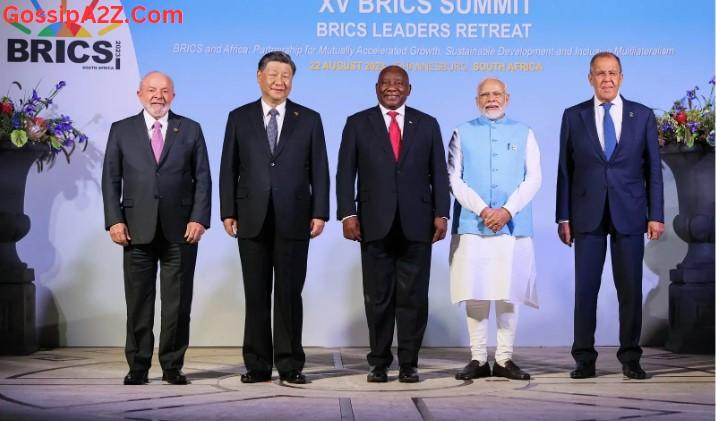BRICS Summit: Membership Expansion Discussed
South African President Cyril Ramaphosa stated on Wednesday that the five BRICS nations are open to enlarging the club to include new members as they pursue greater influence in molding the world order.
At its three-day summit in Johannesburg, calls to expand the BRICS — Brazil, Russia, India, China, and South Africa — dominated the agenda and exposed divisions among its members.
China seeks to rapidly expand the BRICS in response to intensifying competition with the United States, but the bloc’s other main power, India, is wary of its geopolitical rival’s intentions.
Nearly two dozen countries have formally applied to join the BRICS, which represents 40% of the world’s population and 25% of the global economy, according to officials.
In Johannesburg, approximately fifty chiefs of state and government have joined BRICS leaders.
The BRICS are a disparate collection of large and small economies as well as democratic and authoritarian states, but they share a desire to challenge the Western-led global order, which they claim does not serve their interests or growing influence.
The group operates based on consensus, and officials reported that the BRICS leaders were discussing the criteria for admitting new members.
Wednesday, Ramaphosa told the summit that all BRICS members have expressed support for expansion.
Earlier, Indian Prime Minister Narendra Modi stated that he supported opening the door to new members and “welcomes moving forward with the consensus”.
“We stand on the cusp of expanding the BRICS family,” said Ramaphosa, who added that he hoped for a “clear solution to this matter” by Thursday’s conclusion of the summit.
“Unrest and transformation”
On his second travel abroad this year, Chinese President Xi Jinping stated that expanding the bloc would “pool our strength (and) pool our wisdom to make global governance more just and equitable.”
“We meet at a time when the world is undergoing significant changes, divisions, and reorganization. It has entered a new period of turbulence and transformation, according to Xi, whose country accounts for approximately 70 percent of the total BRICS GDP.
US officials have downplayed the likelihood of BRICS becoming a geopolitical rival, characterizing the alliance as a “very diverse collection of countries” that includes both allies and adversaries.
The summit has highlighted the differences between Russia and the West over the Ukraine conflict, as well as the support Russia receives from its other BRICS partners in a time of global isolation.
South Africa, China, and India have not condemned Russia’s invasion of Ukraine, and Brazil has refused to join Western nations in supplying arms to Ukraine and imposing sanctions on Russia.
Vladimir Putin, who is wanted on an international arrest warrant for alleged war crimes in Ukraine, was the only BRICS leader who did not attend in person. Instead, he addressed the summit via video connection, railing against sanctions.
According to Gustavo de Carvalho, senior researcher at the South African Institute of International Affairs, Russia was “desperate for friends and partners, so it is not surprising that they are so eager to expand.”
BRICS disparity
Analysts stated that Brazil, South Africa, and India would have to weigh their desire for good relations with China and Russia against the risk of alienating the United States, a significant trading partner, when considering new membership.
As diverse as the BRICS themselves, the applicant countries range from G20 powers such as Indonesia and Saudi Arabia to isolated states such as Iran, which is openly hostile to the United States and its allies.
The level of interest, according to the leaders of the BRICS nations, is evidence that their message resonated strongly in the “Global South” – a comprehensive term for non-Western nations.
President Luiz Inacio Lula da Silva of Brazil, who has championed the BRICS development bank as an alternative to the lending institutions in Washington, DC, stated his support for Argentina’s entry.
Carvalho stated that the South American power dreaded “diluting” the influence of BRICS if it expanded too rapidly.
“Currently, there is a clear division among BRICS members,” he said.
BRICS Summit: Membership Expansion Discussed
